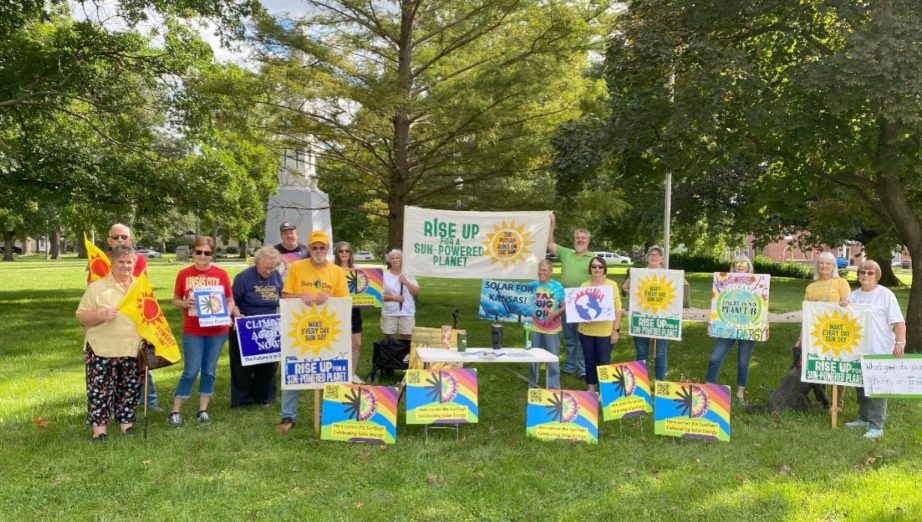
By RUSSELL ARBEN FOX
Insight Kansas
On September 21, the day before the autumn equinox, about 20 people gathered in Memorial Park in Winfield, to mark the conclusion of a local celebration of “Sun Day.” It was a hot Sunday afternoon, and downtown Winfield was pretty quiet. But that didn’t defeat the spirit that was felt by the participants, and the pride they had in doing their part for the cause.
What cause? Solar power, of course.
Sun Day was the brainchild of Bill McKibben, an environmental journalist and activist who has educated millions over the decades with his writings on climate change, renewable energy, local food production, and the conservation of natural spaces. Given the many failures which environmentalism has faced when confronted by the consumptive habits of modern America, McKibben’s work has often been rather dour.
Yet of late McKibben has been enthusiastic, even downright giddy—because amazing innovations in photovoltaic cells, solar grid batteries and more over the past decade have changed the game: renewable means of generating electricity are now, even without government subsidies, cheaper than doing so by burning fossil fuels.
This, McKibben felt, is news to be celebrated.
Hence, Sun Day—a national day of action, with close of 500 events scheduled across the United States and around the world, involving art and music, workshops and worship, all focused on helping people to appreciate the momentousness of this technological and environmental moment, and hopefully. thereby encouraging them to take advantage of and build upon these new opportunities to get power directly from the sun.
Such encouragement is still very much needed. Just because the technology exists doesn’t mean that the transition to it will be simple. The upfront costs are significant, the needed infrastructure is difficult to install, and the financial realities of solar power (from negotiating with China, where most of the advances in the technology are taking place, to negotiating with local energy companies, who want to maintain the profitability of their grids) are complicated to say the least.
On top of that, falsehoods about renewable energy—some of which can be traced back to Kansas’s own Koch Industries--flow far too easily from both the White House and Topeka, leading too often to county-level resistance to increasingly affordable solar panel installations.
Nonetheless, personal experiences—and business savings—with renewables are combining with political education to build momentum.
Despite cuts in support for alternative energy sources in the Big Beautiful Bill, Evergy still plans to move ahead with its plans for solar projects in Kansas and Missouri (though it’s hedging its bets with new natural gas projects as well), and NextEra Energy in Jackson County isn’t far behind. The growing demand by Kansans for rooftop or deck solar panels are leading to fights with homeowner associations, all while more farmers, hospitals, and homeowners are seeing the light (literally).
A personal confession of interest here: we installed solar panels on our Wichita home over three years ago, and aside from one breakdown with our connection to the grid early on—which was, I admit, an expensive pain—our electric bills have been a tiny fraction of what they once were ever since.
Looking around Kansas’s largest city, I see solar start-ups and increased interest everywhere. A full transition to renewables is still years, if not decades, away. But on Sun Day, in downtown Winfield, this more environmentally sustainable and financially affordable future seemed closer to me, and my fellow renewable energy advocates, than it ever has been before.
Dr. Russell Arben Fox teaches politics at Friends University in Wichita.






